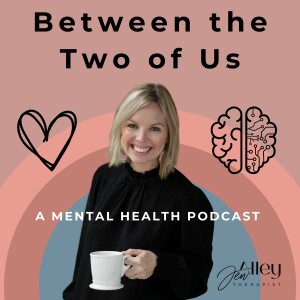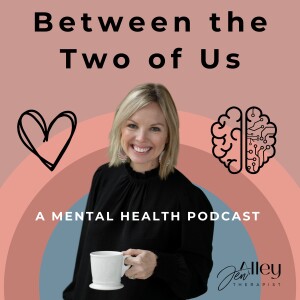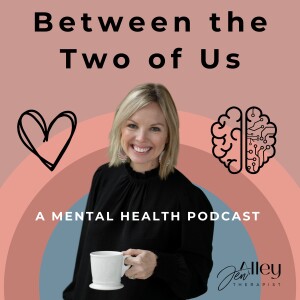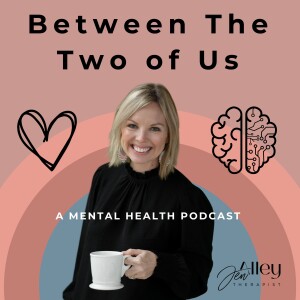The Mental Health Coach | Coping Skills, Boundaries, Grief, Trauma, Marriage Counseling
Neuroscience-Backed Wellness Support for Parents *Top 10% Globally Ranked Podcast* Are you tired of feeling alone on your journey of being a parent and having to juggle so much between work, family, and managing all of the things? Is it hard to remember a time when you felt happiness and joy because you are constantly overwhelmed by life’s demands? Do you long for a deeper connection with your partner, kids, or friends, and wish you had a supportive community to help you navigate this challenging season of life? I am so glad you are here! This podcast will provide you with real life stories, neuroscience-backed strategies, and practical skills to help you feel less alone on your journey toward greater joy, authenticity, and improved mental and relational well-being. Hi, I’m Jen Alley. I’m a wife, a mom, a Licensed Professional Counselor, and a coffee fanatic. Just like you, I am trying to figure it all out as I navigate this one messy and beautiful life I have been given. I know that even good lives come with challenges including parenting struggles, trying to stay close to your partner in the grind of life, trauma, grief, addiction, relationship difficulties, and aging parents just to name a few. I have been guilty of trying to get through the hard times alone and presenting a polished exterior while struggling on the inside. Over the years, I’ve learned that perfectionism is isolating, that we are meant to be in community, and that vulnerability can be connecting and healing. I’ve also learned that having strategic systems in place can help reduce overwhelm and allow us to reconnect with ourselves and the people who matter most to us. I’m excited to be your mental health coach. I will share therapeutic concepts, brain science, and real life stories with you to help you better understand yourself and to improve the relationships that matter most to you. If you are ready for actionable strategies, tools, and skills to feel more present and less stressed… Authentic stories that help you feel less alone in your journey… And research, therapeutic concepts, and neuroscience made accessible to help you navigate your struggles and relationships with more ease… Throw on your tennis shoes for a walk or grab your own cup of coffee and let’s get started! PS. This podcast is not therapy, but it is a great adjunct to therapy. Life is hard. Let’s do it together!
Episodes

Wednesday Dec 27, 2023
Wednesday Dec 27, 2023
For those that celebrate, Christmas is now over and the new year is right around the corner. And with a new year comes ideas about what we want our year to look like. For many of us, it means setting goals, intentions, and resolutions.
A 2022 poll by YouGov found that 37% of Americans indicated they had a goal or resolution they wanted to achieve the following year. A Forbes survey showed that the average resolution lasts just 3.74 months. Despite the low long-term success rates of resolution, there is something that seems helpful about setting goals and making steps toward them.
Forbes found that the most common resolutions include improved fitness, improved finances, improved mental health mental health, weight loss, and improved diet. While I personally have some goals in mind for 2024 around moving my body more, finances, and friendships, I am focusing in on two words I have chosen as intentions for 2024: presence and consistency. I love choosing words as an anchor to come back to.
Behaviors, thoughts, and feelings are all connected. While none of these are easy to shift, behaviors are the easiest of the three, and a change in behavior will change how we feel and think. So, if you want to feel or think differently, focus on what behavior you can do that will likely impact how you are feeling and thinking. For example, if you are overwhelmed and thinking about how much you have to do, a brisk, 20-minute walk will likely help clear your mind, improve your focus, and give you energy. I want to remind you that the good news about goals is that we can start at any time. If you miss a day or a week or a month, you can start again. It doesn’t have to be perfect to be effective. If you get off track, notice and start again.
With that, it is important to talk about the significance of one degree difference. While one degree seems small, it will have a huge impact on where we are across time. An example of the one-degree difference is that if a plane leaves Los Angeles for Rome and flies for 12 hours (but is one degree off), it will land in Africa! So, while you can have large goals, it is also ok to just make small shifts in your behavior. Consistency is the key. Across time, you will be in a far different place than had you never implemented the small changes.
Because many of us are hoping to improve our mental health in 2024, here are some of the changes or shifts you will want to focus on:
Drink more water
Create a gratitude practice
Get 7-9 + hours of sleep
Exercise
Get outside
Practice mindfulness
Focus on improving your social connectedness
I wish you a happy and healthy 2024! Please let me know what your goals, resolutions, and intentions are! You can find me @jen.alley.therapist on Instagram.
Resources:
Atomic Habits
The Power of Habit
Daily Tracker
Intentional Living Worksheet
Guided Mindfulness Meditation

Wednesday Dec 20, 2023
Wednesday Dec 20, 2023
The holidays can be a super difficult time for folks who are grieving. Emotions tend to be amplified during the holiday anyway, and grief in particular can be exacerbated because of memories and feelings of loss or aloneness that might come up. Grief during this season can certainly be in regard to bereavement (grieving the death of a loved one), or it also might be following a divorce or breakup, shifting family dynamics, illness, being in relationships that are unhealthy or not how you want them to be, or feeling really alone.
We often want to be able to predict and “get over” our difficult emotions. But I think grief is a really important part of the experience of loving and loss or wanting something to be so different than how it is. Many times, there is a before and an after with grief- things never go back to being the same as they were before. However, as we feel our emotions and are in relationship with the grief, we can learn to integrate the loss into a life that has meaning, value, and love. We can emerge from the grief transformed.
One of the things that makes grief extra difficult is our culture’s lack of ritual and time and understanding of the grief process. Western culture is demanding and wants us back at work by Monday. We are expected to just get over it and many times, to navigate it on our own as we live in a “pull yourself up by your bootstraps culture.” The reality of grief and our culture’s reality are often at opposite ends of the spectrum and have opposing needs. Grief needs slowness, care, time, and space.
Community and support (including groups or individual therapy) are a huge resource in the grief process and can help us to feel less alone. Feeling alone in grief often adds additional stress, pain, and even trauma. During the holidays, especially, we might be with others who are sharing the same loss (ie. the death of a parent). Despite the shared experience, it is likely that you and your sibling are going to experience the grief differently and even need different things. While one sibling might want to talk about it, the other might find it too painful. I think the most important thing we must do is identify what we are feeling and needing (when possible) and try to communicate that to those around us. It might be as simple as, “I need some down time,” or, “I want to have an intimate celebration of life with our family at the park over the holiday to remember our person.”
We also must have a lot of compassion and grace for ourselves and others as we navigate these big feelings. It might be helpful for you to create traditions or plan activities that you will do to remember your person or to care for yourself in your grief. You might want to do these alone or with others. Journaling, spending time grieving, spending time in nature, creating, or talking about your grief can all be helpful.
Grief has many physical, mental, emotional, and even spiritual manifestations. I will link a handout you can refer to below for a more detailed list, but it is important to know that grief is a full body experience and can cause a great deal of stress on our bodies. Taking care of ourselves during the grief process might feel very hard, but it is important to listen to what our bodies are needing. Doing things that complete the stress response cycle each day can be a helpful practice for releasing stress during grief. The handout linked below can offer many ideas for doing this.
When you are supporting others in their grief, it is important to be empathic, compassionate, and flexible. The grieving person might be irritable or might withdraw and want to isolate. They might want to talk incessantly about their loss or not want to talk about it at all. As a compassionate friend/partner/parent, our job is to just hold space when we feel we can and be non-judgmental about how the other person is handling their grief. Of course, if we feel someone needs extra support (like from a mental health professional), we can suggest that. Often, what people who are grieving need most is compassion and kindness. They also need us to be in it for the long haul as grief is a marathon and not a sprint. There is nothing we can say to make it better or fix the other person’s grief, and that is not our job. It can be helpful to do tangible things for the grieving person (like running errands, picking up kids, making meals, etc.). It is important to respect the grieving person’s boundaries. They may need more leniency around changing plans last minute, deciding not to attend a family event, or even wanting to talk about their grief and then changing their mind.
Grief is a normal human response, but it is really a difficult thing to navigate. Should you need support around your grief this holiday season, grief support groups or therapy can be a super valuable resource. See below for handouts from today’s episode/blog.
Grief handout: Includes manifestations of grief, self-care in grief, and how to support others who are grieving (it also includes what NOT to say)
Brené Brown Empathy Short
Burnout

Wednesday Dec 20, 2023
Wednesday Dec 20, 2023
In the last two weeks, I have talked with so many friends and clients about the holidays and what it brings up for them. While we are sold the idea of the magic of the season, most of the folks I talked to shared hard stories of everything from feeling stressed with all of the social and family engagements and pressure to feeling lonely and sad about family relationships that are severed because of dysfunction or trauma.
One of the major challenges of the holiday’s boils down to expectations. Hallmark, social media, and our society paints a picture of twinkly lights, bottles of champagne, cheery gatherings, beautifully wrapped gifts under the tree, and a crackling fire keeping everyone warm. Consumerism and materialism are constantly knocking at our door to buy all the things and this pressure only ramps up during the holidays. However, for most people, even if the holiday appears picture perfect, it doesn’t FEEL that way.
I remember a professor of mine from grad school saying that many people feel better being at least two state lines away from their family of origin or their in-laws. And even if that isn’t the case with you, and you feel generally close with your family, the truth is that spending extended time together as many do over the holidays can bring up stress and anxiety or even pain, hurt, or unresolved trauma. Reality at best often includes the stressors like perceived obligations as well as competing wishes and traditions like what time we must eat, what will be served, which presents should be wrapped versus unwrapped if they are from Santa or how we will open gifts- one at a time or all at once.
Traditions themselves can become problematic when there is disagreement on exactly what the tradition should be. At most family gatherings, there are also interpersonal conflict and differences of opinion in terms of religion, politics, or even how you are parenting your kids. Whether or not you like to hang out with your extended family, it is easy to feel a sense of obligation around how you spend your time during the holidays. There are also often expectations around gift giving or what you do as a family that might bring up extra strain financially or even in regard to values- for example, if you tend toward minimalism, you might not want your kids to receive piles and piles of gifts that have been generously given but infringe on the life you are trying to build. Or, maybe you don’t feel you have the finances to be buying gifts for everyone in the family or going to holiday shows and events but that seems to be the explicit or implicit expectation. One friend said that for her, the hard part about the holidays is, “Managing expectations. Yours, mine, the kids, everybody’s. It always seems like everything is a hassle and then a let-down but then we post pictures like it was amazing.”
Additional challenges can arise when there are two sides of the family (or perhaps even more if you or your family members are divorced). It can feel like a human tug of war to try to fit everyone and everything in and can leave all of us feeling exhausted instead of recharged after the “most wonderful time of the year.” As extended families grow larger through marriage and birth, dynamics often become trickier and it can feel really hard as traditions shift and relationships change. It is common for there to be struggle and even grief as family dynamics shift and as grown children form their own families and traditions.
At worst, reality can be much more difficult and dark. Things like illness, grief, abuse, addiction, major mental illness, or a family history of neglect or dysfunction can make the holidays a really difficult time. I also have clients who feel deep sadness and loneliness around the holidays. Whether they are single, cutoff from family members, or are married with kids but don’t have a good relationship and are far away from extended family, the feelings of hopelessness and sadness of not having people, close relationships, or family tend to increase this time of year.
I know of people fighting cancer this year, another recovering in ICU from a stroke, and a friend of a friend whose husband is fighting for his life. I will cover more about grief and the holidays in episode three, so be sure to check that out, but for the sake of this podcast, I just want to name that there are some people navigating some really difficult times like their first holiday without a loved one or knowing it is the last.
Here are some practical things we can do to help our mental health during this holiday season.
I would encourage you to make a list or a calendar of what is important to you over the holidays. Time off is precious and for many of us, rare, so taking time to really assess what your needs are (or what your family’s needs and wishes are) is important. Identify what others (including work and family or friends) are expecting of you. You might want to assess how you feel toward each of these things and also what the emotional cost of these events might be. Based on all of this, you might choose to set boundaries around what you say yes and no to. Hard truth: what you choose to do or not to do will likely disappoint others. This is hard, but it is also important to live your one authentic life. People might feel disappointed, upset, or frustrated, but boundaries protect the relationship so we don’t become resentful. If you need help with boundaries, I highly suggest my friend and mentor’s book that was just released- Setting Boundaries that Stick by Juliane Taylor Shore.
Check in with yourself. Pay attention to when you start to feel overwhelmed or stressed and give yourself a chance to reset (go to the restroom, do grounding exercises, go outside, call a friend, take a walk).
Keep up with your self-care as much as possible- exercise, sleep, and eat healthy when you are able to.
Talk with friends or a therapist to get support around navigating the holidays. Knowing you are not alone in your struggle or feeling heard can go a long way.
Limit drinking/numbing- bring awareness and mindfulness to these behaviors and when possible, talk to someone or choose a healthier behavior to help you self-soothe. That said, don’t be hard on yourself when you do find yourself numbing as your body is doing the best it can to self-regulate and feel better.
The reality is that the holidays are probably not going to be perfect. Know that people will do the things they do and work on helping yourself stay in a better place by setting appropriate time boundaries around what you are able to do and give yourself an exit plan if you need to.
Don’t strain relationships unnecessarily – avoid triggering topics and know in advance about how much time to spend. Allow yourself an out and stay for an amount of time that feels doable for you. If there is violence, abuse, or someone is doing something that makes you or your family unsafe, it may be important to set physical boundaries or not attend even if that means upsetting others.
Remember that you and others are generally doing the best they can.
As you are with the reality of holiday, grief may come up as it might feel disappointing or sad.
When possible, practice gratitude. Look for what is good but also seek connection and support in the hard.
Resources:
Mental health tracker
Setting Boundaries that Stick by Juliane Taylor Shore
Crisis hotlines: Text HOME to 741741 (for any crisis) 24/7 hotline
Call or text 988 or chat 988lifeline.org (suicide and crisis lifeline) 24/7
Nonviolent communication handout- find it at www.jenalley.com/podcast and look for this episode
Be sure to subscribe so you don't miss an episode.

Monday Nov 20, 2023
Monday Nov 20, 2023
Welcome to Between the Two of Us, a Mental Health podcast. Grab a cup of coffee or slide on your tennis shoes for a walk while we explore what it means to be human and get real about the beauty and challenges of life.
I want to destigmatize mental health and make therapeutic concepts and neuroscience more accessible. Hi, I am your host, Jen Alley. I am a Licensed Professional Counselor, a wife, and a mom of two school-aged kids. I am a nerd for research and learning, and I want to use the Between the Two of Us podcast to share ideas, strategies, and exercises to help you live with greater joy, authenticity, and improved mental wellness.
My guests and I will share stories and struggles from our own lives to help you feel less alone as you move through challenges in your life. We will tackle questions like, What is mental health? How do I improve my relationships? How can I feel closer to my partner? What do I do when I feel stressed, overwhelmed, or have big emotions? How do I cope with anxiety or depression? Why is parenting so hard sometimes and what can I do to make it better? How do I heal from trauma or grief? How do I find more purpose or meaning in my life? When should I see a therapist or psychiatrist?
Just like you, I am trying to figure it all out as I navigate this one messy and beautiful life I have been given. I believe that doing life with others is so incredibly important. Knowing we are not alone (and are normal) is a critical piece of feeling like we belong. You belong here! Welcome! You can connect with me at www.jenalley.com or @jen.alley.therapist on Instagram, Facebook, and TikTok.


